When we talk about the trends in car rental apps, we’re diving into a world of innovation and convenience that’s completely reshaping how we think about transportation.
Car rental apps are changing quickly, bringing in new trends that will make your users' experience better than ever. From electric cars to price-powered by AI, these apps are becoming smarter, faster, and more focused on what users need.
The future of car rentals isn’t just about getting from one place to another; it’s about making your journey easier, more sustainable, and customized to your preferences. In 2025, the emerging trend for car rental apps is all about creating a smooth, contactless, and personalized experience.
Let’s explore what’s driving these exciting changes and how developers are shaping the next wave of car rental apps through the latest technology trends.
What is a Car Rental App?
A car rental application is a mobile application that allows users to search, book, and rent vehicles for a particular time frame without much hassle. They have several types of cars to choose from, from small automobiles to luxurious cars.
Most apps offer real-time availability, no-contact check-in, and frictionless payments. Car rental applications aim to speed up the car rental experience, simplifying it and personalizing it by easily adapting it to the needs of an individual user.
With the expansion of the automobile rental enterprise, these applications are integrated with the latest technology trends, providing AI-based pricing and green cars, among a whole lot else. Rapid growth and innovations in car rental apps have made a huge difference in the way people travel today.
Let’s take a closer look at the market statistics of car rental apps to understand their impact and future potential.
Market Statistics of Car Rental App
As more consumers are looking for convenience, the market for car rental apps is expanding rapidly. This shift is driven by the increasing demand for seamless, on-demand transportation solutions and the adoption of innovative technologies within the industry.
Here are some key statistics highlighting the current trends in car rental apps:
-
- According to Statista, the United States is expected to generate the most revenue in this market, with a projected revenue of $33 billion in 2025.
- Based on a report by Grand View Research, car rentals for local usage are expected to grow at a CAGR of 12.1% from 2025 to 2030, driven by rapid urban growth, evolving travel habits, and the demand for convenient transportation options.
- Straits Research indicates that the global online car rental platform market size was valued at USD 94.75 billion in 2023 and is projected to reach $245.1 billion by 2032.
- In the United States, car rental companies are adjusting to the popularity of ride-sharing services by providing more flexible rental choices and loyalty programs.
As these statistics show, the future of car rentals is deeply tied to technological advancements. Let's dive into the top trends of car rental apps that are driving the industry's evolution.
Top Trends in Car Rental Apps
These trends focus on improving user experience, increasing convenience, and utilizing the latest technologies to stay ahead in the competitive market.
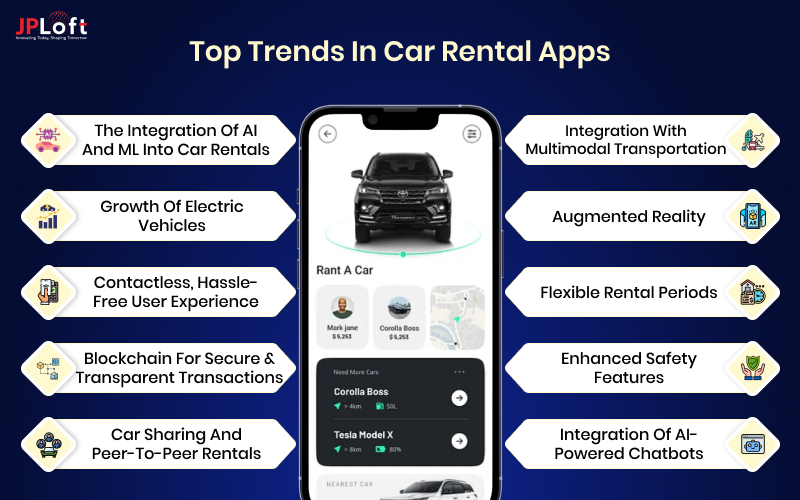
Let’s dive into the key trends in car rental apps that will define the future.
1. The integration of AI and ML into Car Rentals
Artificial intelligence (AI) and machine learning (ML) are some of the trending AI and ML applications in many industries. By 2025, the car rental app market trends suggest that these technologies will tread into further prominence.
Car rental app trends will be leveraging AI and ML to build very intelligent and intuitive platforms. You can create an AI app in the car rental segment that will help predict customer preferences based on their past behavior when selecting the options to present to the user.
Be it suggesting the type of car, the route to drive along, or the best time to rent, AI will enhance personalization for easy and speedy booking. Moreover, ML will help improve fleet management to ensure proper maintenance and support services.
Benefits:
-
- Improved Customer Experience: AI analyses customer behavior and recommends rentals accordingly.
- Dynamic Pricing Models: Machine learning will be used to change prices dynamically to ensure competitive pricing depending on seasonality, demand, and special events.
- Fleet Management Optimization: The app can predict vehicle availability in real time and manage bookings to minimize the chances of over- or under-booking.
2. Growth of Electric Vehicles (EVs)
With the rising concern for the environment, the car rental industry has been forced to adapt. While electric vehicles (EVs) are destined to garner increasing popularity among new trends in car rentals, the car rental apps point to a greener future.
In 2025, more car rental apps will add EVs to their fleets in order to accommodate eco-conscious consumers and comply with government regulations to reduce carbon emissions.
One of the most crucial car rental app development trends is using AI to monitor the availability of EVs in their fleets and guarantee that these vehicles are on standby for use.
Renting an electric car could offer bonus benefits, such as free charging and discounts for renters who choose longer rental periods.
Benefits:
-
- Sustainable Alternatives: EVs will take center stage among rental fleets, and the driving force becomes a sustainable alternative to conventional vehicles.
- Plug-n-Free EV Experience: Unblocked charging stations and zero-touch EV rental management experience.
- Government Incentives: Rental companies may offer special deals or discounts for customers opting for EVs, thus boosting sustainability.
3. Contactless, Hassle-Free User Experience
The pandemic has raised a demand for all contactless services and seems to be a permanent change in consumer behavior. In 2025, the focus of trends in car rental apps is falling squarely on providing users with a seamless, contactless experience.
Car rental apps are set to experience growing adoption of biometric authentication, keyless entry, and remote access to vehicles. Users will unlock their cars through smartphone apps or facial recognition, avoiding any direct interaction with rental agents.
This not only increases security for users but also optimizes the rental process by making it much faster and hassle-free.
Benefits:
-
- Digital check-in/check-out: Users will be able to manage their entire booking process using a digital interface without any face-to-face contact.
- Biometric authentication: facial recognition or fingerprint scanning will supersede conventional identity verification.
- Keyless entry: Users can access and start their cars by using a smartphone app.
4. Blockchain for Secure and Transparent Transactions
Blockchain technology is revolutionizing a host of industries and is surely one of the central car rental app trends. By 2025, many rental companies will give priority to secure transactions using blockchain to ensure transparency and security in their operations.
Users will get tamper-proof agreements and payments with blockchain applications. Future design trends in car rental apps will include blockchain-based systems and ensure total security over any financial data and customer interactions.
The cost to create a car rental app by integrating such trendy features can be high. But it will ensure the long-term success of your app. Smart contracts will automatically manage rental agreements through transparent transactions, ensuring the terms are enforced without the need for manual intervention.
Benefits:
-
- Decentralized Transactions: With blockchain, every payment and contract will be securely recorded and authenticated.
- Smart Contracts: Such contracts are self-executing once a condition or conditions are met, which means no human error or fraud is expected.
- Enhanced Customer Trust: Blockchain’s transparency and security will build greater trust among customers, knowing their transactions and data are safe.
5. Car Sharing and Peer-to-Peer (P2P) Rentals
A new trend in car rental, peer-to-peer (P2P) rentals, has arisen in the past few years thanks to a rising sharing economy. This trend will continue to be in demand, especially considering that P2P will become integral to car rental app trends for businesses in 2025.
In a P2P model, individuals have the option of renting their vehicles to others while not in use, providing them with more options and greater flexibility. Car rental apps will offer features such as car availability and secure payment methods, and insurance options to help facilitate these transactions.
Owners of cars profit from this model in that it offers greater choice to the customer while at the same time allowing the owner to earn extra income. It is another trend in car rental app development.
Benefits:
-
- Diverse Selection: They provide a wider selection of cars, from economy models to luxury vehicles.
- Flexibility of Rental Duration: Users can rent a car for shorter hours, which is suitable for just the hours they need to run errands.
- Insurance and Security: Apps include insurance coverage and safety checks to promote user-friendly transactions.
6. Integration with Multimodal Transportation
Integration with multimodal transportation becomes part of a bigger ecosystem of transportation options.
This would be a welcome proposition for customers who wish to plan a trip combining car rentals and other means without the nuisance of flicking between apps. This shift is one of the key car rental app development trends, enabling a seamless, integrated experience that enhances convenience and flexibility for users.
Partnering with the best mobile app development company can ensure that customers can combine different transportation options for a more flexible and convenient travel experience.
Benefits:
-
- Unified Travel Planning: Apps will allow users to formulate plans that combine disparate forms of transport to optimize convenience, followed by cost.
- Live Updates: Updates on what modes of transport are available will be provided to users via the apps in real-time, allowing for adjusting plans on the fly.
- Seamless User Experience: By integrating multiple transportation options into a single app, users will enjoy a streamlined and hassle-free experience, eliminating the need to juggle between different platforms.
7. Augmented Reality: The New Revolution in User Experience
Augmented reality (AR) is among the most thrilling technologies expected to transform car rental apps. With this technology, car rental apps can provide an immersive and interactive experience for their customers.
For example, an AR feature in the app could allow users to explore a rental car before making a booking. You can view the car's interior and exterior in a 360-degree view, helping you get a better feel of the vehicle.
Additionally, this design trend in car rental apps could let users visualize their driving experience, showing important details like the car’s navigation system or infotainment features directly within the app. This would make it easier for users to understand the car's capabilities before renting.
Benefits:
-
- Virtual Car Exploration: Users can tour cars in a 3D virtual environment to help them decide on the car that best meets their needs.
- In-App Guidance: AR could guide users on how to take advantage of their vehicle's features, from seat adjustments to navigation, making the entire rental experience better.
- Interactive Information: AR will give live information regarding the rental offered, for instance, features available on the vehicle or where nearby charging stations are for electric cars.
8. Flexible Rental Periods and Subscription Models
In 2025, flexibility is paramount in striking a chord with customers. Trends in car rental apps will shift toward enhancing the flexibility of rental terms so as to fit various customer needs.
Each rental service will have hourly, daily, or even monthly holistic terms while offering customers the possibility of vehicle swaps in accordance with their preferences.
Benefits:
-
- More convenience for short rentals: Customers are able to rent for several hours, which means that they can run a quick errand or tour around the block.
- Subscription-type rentals: Car rental apps offer subscription services wherein they allow users to drive varying types of vehicles upon the payment of a fixed monthly fee.
- Flexible rental options: Rental terms are good in the 21st century, according to demand for any length of time, a short trip across town, a weekend away, or long business trips.
9. Enhanced Safety Features and In-App Monitoring
The safety of their vehicles and the well-being of their customers are always the main priorities with car rental companies.
However, these will increase exponentially with app design trends in car rental apps incorporating advanced safety features of car rental apps to enhance vehicle safety and user protection.
Benefits:
-
- In-App Safety Alerts: Safety alerts from apps will include real-time alerts about fastening seat belts and checking tire pressure.
- Driver Behavior Monitoring: Car rental apps may monitor driving behavior through their sensors or connected devices, providing feedback on driving issues.
- Emergency Assistance: Emergency buttons in the app, a growing trend in car rental app development that helps to connect customers with 24/7 support or emergency responders.
10. Integration of AI-Powered Chatbots for Customer Support
AI-powered chatbot development are becoming common in many industries, and a car rental sector is no different. In 2025, trends in car rental apps will see chatbots providing instant customer support.
Whether it be to answer questions about car availability and rental policies or assist users in booking, these AI-powered assistants will enhance customer interaction.
Benefits:
-
- 24-Hour Availability: The chatbots will help the users 24/7, answering their queries instantly for a better customer experience.
- Personalized Support: AI will leverage customer data to extend personalized recommendations and guidance throughout the rental process.
- Instant Resolution: In real-time and therefore with much less waiting time for support, they will address problems where the booking has gone awry or inquiries are being made regarding payment.
These technological trends of car rental apps will make transportation planning simpler and more efficient, supporting the growing trend toward sustainable and interconnected urban mobility.Trendy Car Rental Apps for Inspiration.
Trendy Car Rental Apps for Inspiration
With the booming market for car rental apps, several of them are evolving and provide innovations for others to learn and stay ahead in the competitive market.
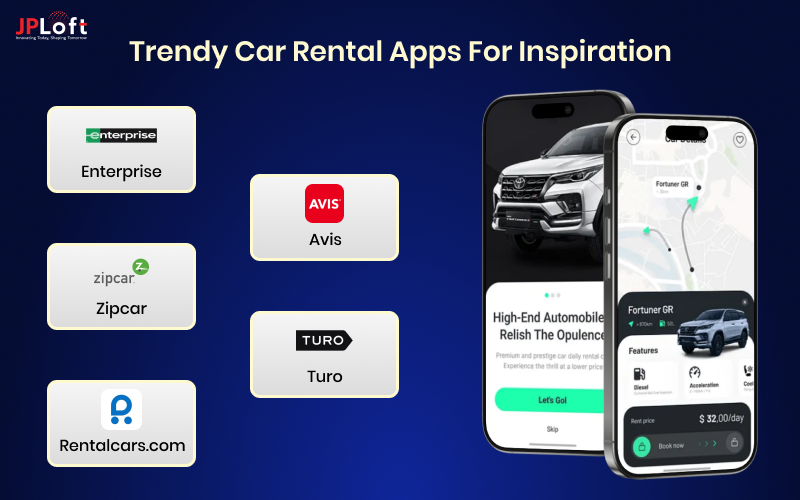
If you want to develop a car rental app, here are the popular car rental app market trends leading the way for 2025.
1] Enterprise
Being one of the most established brands in the car rental circles, Enterprise exemplifies significant trends. The seamless amalgamation of customer-supported services with information technology.
Through its app, a user can easily browse through available cars, choose pick-up and drop-off locations, and receive customized recommendations based on past preferences.
Enterprise's focus on user-designed mobile apps, as well as user post-sale support, is something that can inspire car rental app trends for businesses to extend stronger relations with their clients.
2] Avis
Avis is another car rental app that provides an advanced fleet management system integration, which is one of several appealing features.
This includes real-time tracking of available cars, predictive maintenance for vehicles, and efficient fleet utilization. Adapting similar technological solutions for monitoring vehicles can prove to be a key trend.
Enhancing fleet management practices is something all those launching themselves into the car rental app space can look up to. The importance of data-driven decisions and real-time information is growing in the next-generation car rental app trend.
3] Zipcar
Zipcar transformed the car rental industry by introducing the concept of car sharing. They revolutionized the mobile app experience, enabling customers with short-term rental needs to access vehicles on an hourly basis with great flexibility.
Their entry into the car rental market aligned with the growing demand for sustainable and cost-effective transportation, particularly in urban areas.
By adopting the model of hourly rentals and making them easily accessible through a mobile app, Zipcar set a new standard. For businesses looking to create an app in the car rental space, this approach offers valuable insights into meeting the needs of modern consumers.
Such companies will allow themselves to serve an emerging market that values flexibility and convenience, coinciding with ongoing trends in car rental apps.
4] Turo
Turo puts the conventional business model of car rentals upside down because it offers peer-to-peer car rentals. Users can rent cars directly from vehicle owners through its app, completely bypassing traditional rental companies.
This has opened up a disruptive new model, generating a marketplace that includes unique vehicles, including luxury, exotic, and vintage cars.
There are peer-to-peer car rental trends while creating a car rental app that provide car rental app businesses a significant opportunity to introduce such modes to their operations.
If you create a car rental app like Turo, it can give more personalized options to its customers, increasing the variety and exclusivity that these customers require.
5] Rentalcars.com
Rentalcars.com is the leading car rental app, allowing users to choose a variety of options from rental agencies worldwide. It is designed quite simply and rapidly.
This enables various comparisons of prices of car rentals from many areas, thus allowing users to get the quickest booking possible. That simple approach to worldwide rentals is inspiring businesses to think about ways that users can be given a quick and smooth path to bookings.
This is one of the crucial ongoing trends in car rental apps, revolving around the simplification of an unforgettable customer journey.
The car rental app market is evolving rapidly with new trends that emphasize convenience, personalization, and innovative business models.
As 2025 unfolds, staying on top of these trends will be key to developing the next-generation car rental app trends.
Tips to Make Your Car Rental App Future-Proof
To ensure your car rental app stays relevant and competitive in the coming years, it's essential to adapt to emerging trends for car rental apps and leverage the latest technology trends.
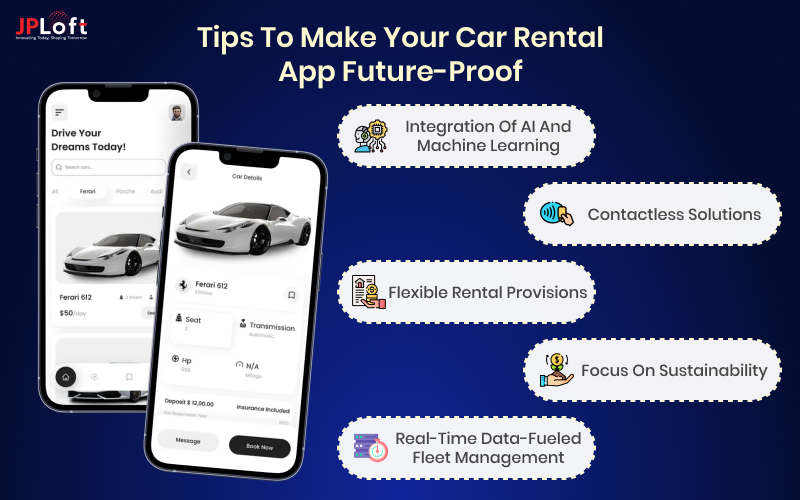
Here are some practical tips to future-proof your app:
-
- Integration of AI and machine learning: Use artificial intelligence to foresee customer preferences, improve fleet management, and provide personalized recommendations. AI has gained huge momentum in car rental app trends. So, if you’re looking to stay ahead of the curve, consider partnering with an AI app development company to create a powerful app for improved customer experiences and operational efficiency
- Contactless solutions: Increased customer expectations for contactless experiences. Integrating features such as contactless key pickups and mobile payments resonates with the emerging trend for car rental apps, thus enhancing user comfort.
- Flexible rental provisions: Short-term rentals, hourly rentals, and car-sharing features should be introduced. Flexibility in the delivery of rental offerings is becoming critical to the trends while creating a car rental app, since it caters to customers looking for convenience and affordable pricing.
- Focus on sustainability: Keeping an eye out for eco-consciousness, you may even consider adding electric vehicles (EVs) to your fleet. Embracing greener technologies is not just the latest technology trend, but is also being more and more demanded by users.
- Real-time data-fueled fleet management: Real-time vehicle tracking, predictive maintenance, and instant availability updates will go a long way in streamlining operations and providing customer satisfaction. These will fall right under the line of the emerging trend for car rental apps.
By developing the app with the suggestions above, you can be assured of excelling against your competitors and within the changing demands of consumers.
Why Choose JPLoft for Developing a Car Rental App?
When it comes to building a top-notch car rental app, choosing the right car rental app development company is crucial, and that’s where JPLoft shines. With a proven track record of creating innovative, user-friendly apps, we ensure your app stands out in a competitive market.
Our team stays ahead of the curve by integrating cutting-edge technology like real-time tracking, seamless booking features, and smart fleet management. If you are looking to offer flexible rental options or enhance the customer experience, then it can be the perfect place for you. We customize every detail to meet your specific needs.
By choosing JPLoft, you’re not just getting a company; you’re getting a long-term partner dedicated to making your car rental business future-ready. Ready to take your car rental app to the next level? We are here to help you out.
Final Wrap Up
In 2025, the world of car rental apps is poised for remarkable innovations. In the ever-changing technological environment, there has been an evolution in customer preferences, and companies must thus adapt to remain relevant.
From fine-tuning AI recommendations to seamless booking experiences, flexible rental, and sustainable practices, these trends are poised to shape the future of car rental applications. To thrive in this fast-changing market, car rental companies must incorporate these trends and embrace new technologies.
Personalized service, user-friendly interfaces, and real-time tracking will be important to attract and retain customers. The future looks very bright for the car rental industry, which is full of new opportunities for purpose-driven innovation and improvement.
FAQs
This trend may comprise AI-powered personalized features, contactless rentals, flexibility of rental options (as in hourly rentals), integration of electric vehicles, and fleet management through real-time tracking.
AI will greatly improve user experience through personalized recommendations of cars based on individual customer preferences and behaviors, optimize fleet management, and effect smart bookings that are undemanding to use.
Sustainability is apparently going to take the forefront, with more and more car rental apps incorporating electric vehicles into their fleets and providing greener, eco-friendly options for customers.
The customer experience will be seamless due to largely contactless check-in, faster booking, and user-friendly payment methods directed toward use for customer satisfaction.
Real-time tracking allows customers to search for their vehicle and location, thus being able to effectively manage the fleet and improve the user experience while minimizing time spent idle.





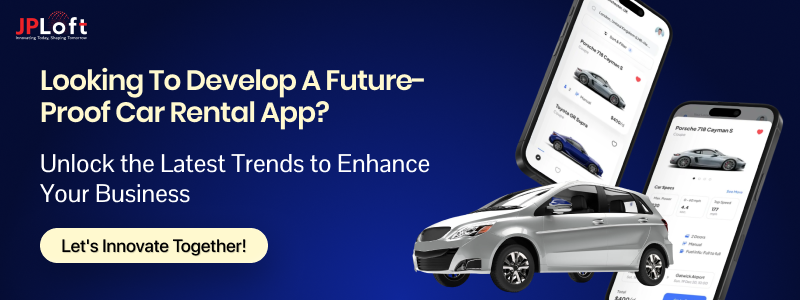


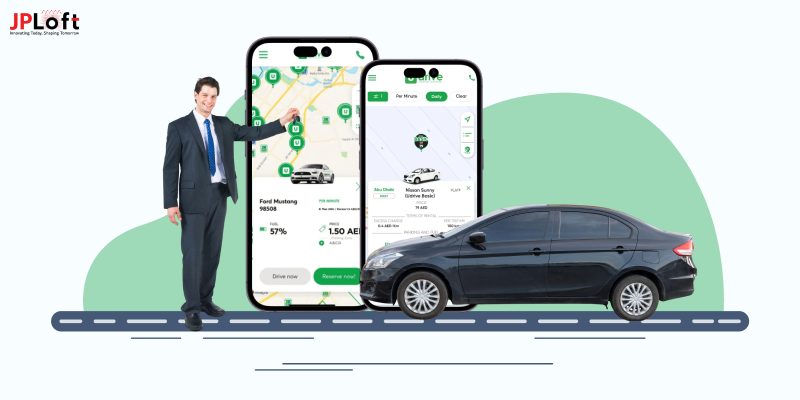
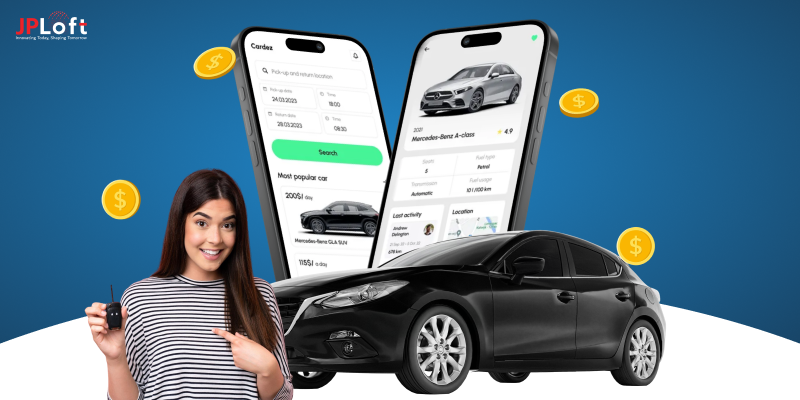
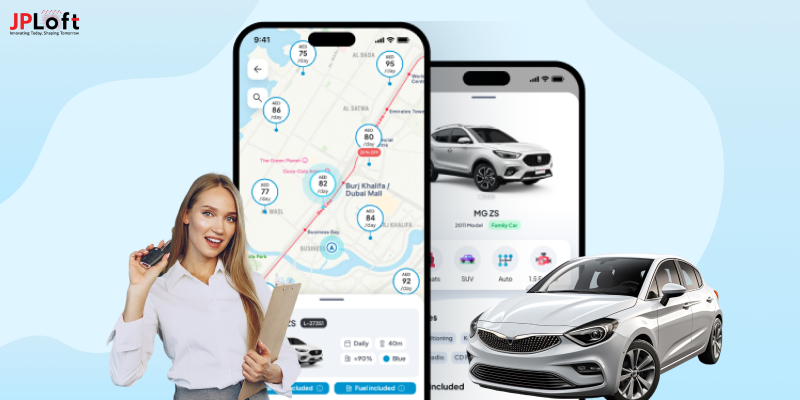


Share this blog